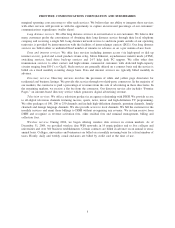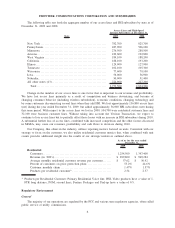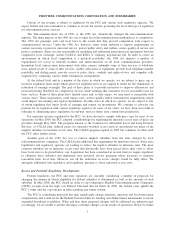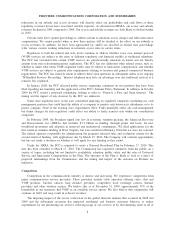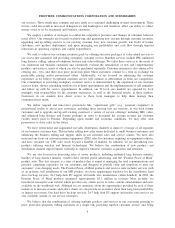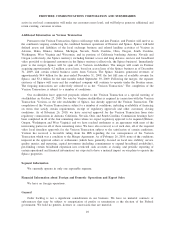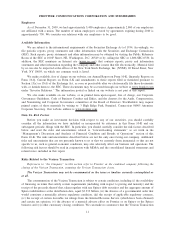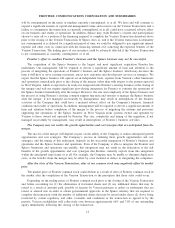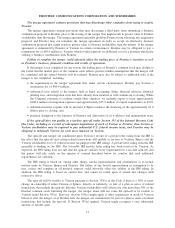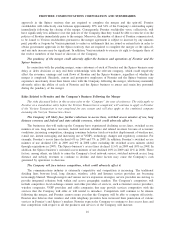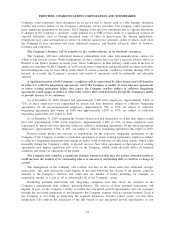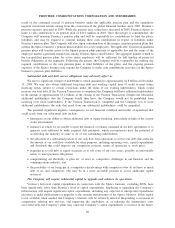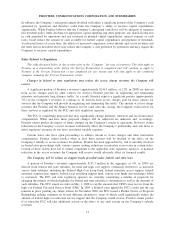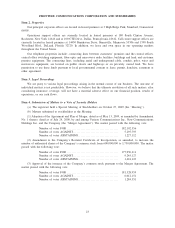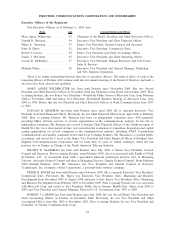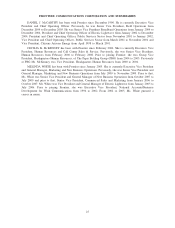Frontier Communications 2009 Annual Report Download - page 17
Download and view the complete annual report
Please find page 17 of the 2009 Frontier Communications annual report below. You can navigate through the pages in the report by either clicking on the pages listed below, or by using the keyword search tool below to find specific information within the annual report.Under a tax sharing agreement, in certain circumstances, and subject to certain limitations, Frontier is
required to indemnify Verizon against taxes on the spin-off that arise as a result of actions or failures to act by
Frontier, or as a result of changes in ownership of the stock of Frontier after the merger. In some cases,
however, Verizon might recognize gain on the spin-off without being entitled to an indemnification payment
under the tax sharing agreement.
If the merger does not qualify as a tax-free reorganization under Section 368 of the Code, Frontier may
be required to pay substantial U.S. federal income taxes.
Frontier expects that the merger will qualify as a tax-free reorganization under Section 368(a) of the Code,
and the obligation of Frontier to consummate the merger is conditioned upon receiving an opinion of counsel to
that effect. Such opinion will be based upon, among other things, certain representations and assumptions as to
factual matters made by Verizon, Spinco and Frontier. The failure of any factual representation or assumption
to be true, correct and complete in all material respects could adversely affect the validity of the opinion. An
opinion of counsel represents counsel’s best legal judgment, is not binding on the IRS or the courts, and the
IRS or the courts may not agree with the opinion. In addition, the opinion will be based on current law, and
cannot be relied upon if current law changes with retroactive effect. If the merger were taxable, Spinco
stockholders would recognize taxable gain or loss on their receipt of Frontier stock in the merger, and Spinco
would be considered to have made a taxable sale of its assets to Frontier.
Frontier will be unable to take certain actions after the merger because such actions could jeopardize
the tax-free status of the spin-off or the merger, and such restrictions could be significant.
Frontier is prohibited pursuant to a tax sharing agreement from taking actions that could reasonably be
expected to cause the spin-off to be taxable or to jeopardize the conclusions of the IRS ruling or opinions of
counsel received by Verizon or Frontier. In particular, for two years after the spin-off, Frontier may not:
•enter into any agreement, understanding or arrangement or engage in any substantial negotiations with
respect to any transaction involving the acquisition, issuance, repurchase or change of ownership of
Frontier capital stock, or options or other rights in respect of Frontier capital stock, subject to certain
exceptions relating to employee compensation arrangements, stock splits, open market stock repurchases
and stockholder rights plans;
•permit certain wholly owned subsidiaries owned by Spinco at the time of the spin-off to cease the active
conduct of the Spinco business to the extent it was conducted immediately prior to the spin-off; or
•voluntarily dissolve, liquidate, merge or consolidate with any other person, unless Frontier survives and
the transaction otherwise complies with the restrictions in the tax sharing agreement.
The tax sharing agreement further restricts Frontier from prepaying, or modifying the terms of, the Spinco
debt securities, if any.
Nevertheless, Frontier is permitted to take any of the actions described above if it obtains Verizon’s
consent, or if it obtains a supplemental IRS private letter ruling (or an opinion of counsel that is reasonably
acceptable to Verizon) to the effect that the action will not affect the tax-free status of the spin-off or the
merger. However, the receipt by Frontier of any such consent, opinion or ruling does not relieve Frontier of any
obligation it has to indemnify Verizon for an action it takes that causes the spin-off to be taxable to Verizon.
Because of these restrictions, for two years after the merger, Frontier may be limited in the amount of
capital stock that it can issue to make acquisitions or to raise additional capital. Also, Frontier’s indemnity
obligation to Verizon may discourage, delay or prevent a third party from acquiring control of Frontier during
this two-year period in a transaction that stockholders of Frontier might consider favorable.
Investors holding shares of Frontier common stock immediately prior to the merger will, in the
aggregate, have a significantly reduced ownership and voting interest after the merger.
After the merger’s completion, Frontier stockholders will, in the aggregate, own a significantly smaller
percentage of the Company than they will collectively own of Frontier immediately prior to the merger.
Depending on the trading prices of Frontier common stock prior to the closing of the merger and before
accounting for the elimination of fractional shares and adjustments for any amounts paid, payable or forgone by
Verizon pursuant to orders or settlements that are issued or entered into in order to obtain governmental
15
FRONTIER COMMUNICATIONS CORPORATION AND SUBSIDIARIES


